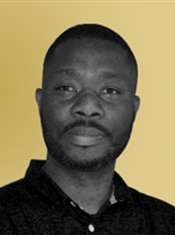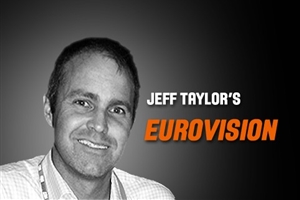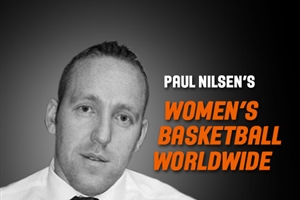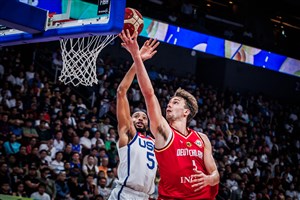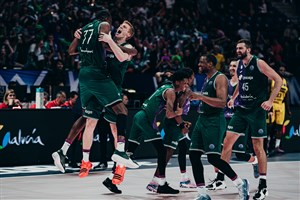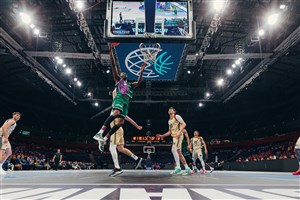
A dilemma for Boungou-Colo
SHEFFIELD (Julio Chitunda's African Message) - Nobel Boungou-Colo is facing a dilemma between playing for his native Republic of Congo and representing his adoptive nation of France.
There are plenty of reasons for both countries to publicly show interest in the services of Boungou-Colo, who plays for Limoges in France's topflight Pro A, as he has made tremendous progress in the past few years.
Last December, he scooped the MVP award in the LNB All Star Game, before being shortlisted for the LNB top-3 performers, last week, though the MVP award was attributed to France international Antoine Diot.
Judging by his age (26), talent and exposure, it is time for Boungou-Colo to decide what is best for his career.
In the year that France, the EuroBasket 2013 champions, are set to compete for a place on the podium at the FIBA Basketball World Cup in Spain, and Boungou-Colo is highly rated, I would not be surprised if he wears the colours of Les Bleus later this summer.
However, back in the Republic of Congo - a country he left at the age of 10 due to his father's diplomatic job in France - Boungou-Colo is expected to play a big role when they host the 2015 African Games, but, for now, few know what is his final decision.
In January of last year, Boungou-Colo told me he was keen to represent his native country at AfroBasket 2013 under certain circumstances, but, eventually, he missed out on the tournament held in Abidjan, where his countrymen finished 14th out of 16.
Boungou-Colo says he has played friendly tournaments for France, but is yet to play official games, which makes him available for either country.
Last summer, he watched on TV as France clinched their first-ever European title.
The 2.01m forward is not the first case, and certainly won't be the last, of African-born players undecided between representing their native or adoptive countries.
In the late 1990s, former Angola international Gerson Monteiro was having tremendous success in the dissolved Liga de Clubes de Basquetebol, Portugal's former top competition.
At the time, he was persuaded to represent the South European country, where he had settled down as a teenager and developed his professional career. Instead he opted to play for Angola and went on to build a successful international career that included appearances at the 2002 FIBA World Championship for Men in Indianapolis as well as the Athens Olympics two years later.
Monteiro's personal averages of 12.8 points and 2.8 rebounds in the 2004 Olympic Basketball Tournament caught the eye of San Antonio Spurs head coach Gregg Popovich - an assistant coach for the USA team at that year's Games - who invited him to join the NBA team for the pre-season, although he was released before the start of the season.
The clock is ticking fast for Boungou-Colo, and I have not doubts that he aims for higher goals for his career.
As a result of his professional career, France seems to offer him more exposure, just like Angola did for Monteiro.
If Boungou-Colo agrees to play for his native country, he is to deal with the Republic of Congo Basketball Federation's modest functionality, although he is adamant the country has chances of rivaling African top teams if they select their best players based in Europe.
He insisted on mentioning the passion for his country, but he acknowledged that the federation should be more professional in order to attract their top performers.
I was wondering whether this was the reason his fellow countryman Serge Ibaka decided to represent Spain internationally.
"I talked to the Congo Basketball Federation, but we did not reach any agreement. I want to make sure that when I make my mind up, I won't regret it," he told me.
Then I asked him how to resolve a dilemma like his, should more players face similar circumstances.
"The solution should serve the interest of both parties," he replied.
"If the Congolese Federation creates conditions and embraces professionalism within the organisation, there would not be problems to join the national team.
"France has a great core of players, and I would like to be part of it. When the time to decide comes, I'll have to measure what's best for all parties involved," he explained.
As for the LNB MVP award, Boungou-Colo was disappointed with the result "because I had a good season, and some former and current players say I should have won it. It is ok, the most important is that my work was recognised in the top-3," he pointed out.
When I caught up with Boungou-Colo last week one word, "professionalism", that he expressed repeatedly made me think that he might be leaning towards France, if the Congolese are unable to put together a functional basketball programme.
Julio Chitunda
FIBA
FIBA's columnists write on a wide range of topics relating to basketball that are of interest to them. The opinions they express are their own and in no way reflect those of FIBA.
FIBA takes no responsibility and gives no guarantees, warranties or representations, implied or otherwise, for the content or accuracy of the content and opinion expressed in the above article.
